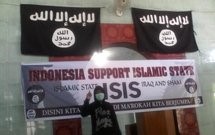 Earlier this year, Indonesia was shocked by ISIS propaganda spread via YouTube to recruit new members. In fact, in certain parts of Java, some have even expressed their willingness to become new members of the ISIS. Given that Indonesia has the largest Muslim population in the world (around 230 million), this has attracted regional and international attention.
Earlier this year, Indonesia was shocked by ISIS propaganda spread via YouTube to recruit new members. In fact, in certain parts of Java, some have even expressed their willingness to become new members of the ISIS. Given that Indonesia has the largest Muslim population in the world (around 230 million), this has attracted regional and international attention.
What is the danger attached to Indonesians joining the ISIS? Will the State’s efforts to prevent and combat extremism be successful, given the hardline Islamic groups interested in becoming new members of the ISIS?
The Indonesians who are now the members of the ISIS are believed to be effectively influencing the hardliners to defend themselves as new members. Their role is to facilitate the ISIS in building relationships with radical groups in Indonesia and gaining the broad sympathy of Indonesian Muslims (The Jakarta Globe, 17 July 2014).
With respect to the ISIS, the Indonesian government has taken a decisive political position. President Susilo Bambang Yudhoyono had instructed his government to control the development of the ISIS.
Prospective Political Stance
Some have questioned the ability of the Indonesian government to combat radical groups in comparison with its direct war on the ISIS. However, it must be acknowledged that radical groups are connected to political power in Indonesia - they have a strategic position through their provision of political resources for elites. It is also important to note that the practice of political decentralisation implies that the centre’sposition to control the emergence of political issues in local areas is less.
It seems that Indonesia is trying to learn from its past experiences by taking a decisive position against the ISIS. A war against the ISIS provides strategic momentum to shadow the historical burden of Indonesian Islam during the last decade, which has been associated with the presence of hard-liner groups. The government is also able to take a definite position against the ISIS because this organisation is international in character has no affiliation with Indonesian politics.
The government has also rejected the ISIS based on their violent propaganda mainly to recruit Indonesian people.
Indonesian Islamic Resistance
In trying to demonstrate Indonesia’s position, Indonesian Islamic scholars and some moderate (liberal) Islamic organisations have stated that the ISIS is not in accordance with the Islamic character of the country. In this context, it would also be interesting to discuss the positions of the existing radical groups that have been part of the Caliphate movement such as Hizb ut Tahr in Indonesia. Although they have a global Caliphate ideology, their position is contrary to that of the ISIS.
They believe that the violence of the ISIS is destroying the position of the Caliphate Islamiyah, which promotes a peaceful path without violence and brutality. They are supported by the specific understanding that the ISIS is clearly not an Islamic movement but one that is using Islam as a tool for global war propaganda. From their point of view, Indonesian Islam has a peaceful image.
In addition to the above, the Indonesian public is also confused by the inconsistency of the Indonesian Ministry of Information and Communication in revoking the ISIS YouTube propaganda. Further confusion arises from the fact that the Minister of Information and Communication has affiliations with the Prosperous Justice Party in Indonesia.
This political party is perceived by the Indonesian public to have connections with the hardline extremist groups within the country, which intend to apply sharia law in Indonesia. In this context, even the Indonesian public has a clear political position against the ISIS. Now, the government needs to introduce significant institutional enforcement to back its stand and take the strong initiative to consolidate different groups within Islam to defending Indonesia against the ISIS.
By Special Arrangement with Institute of Peace and Conflict Studies (http://www.ipcs.org)